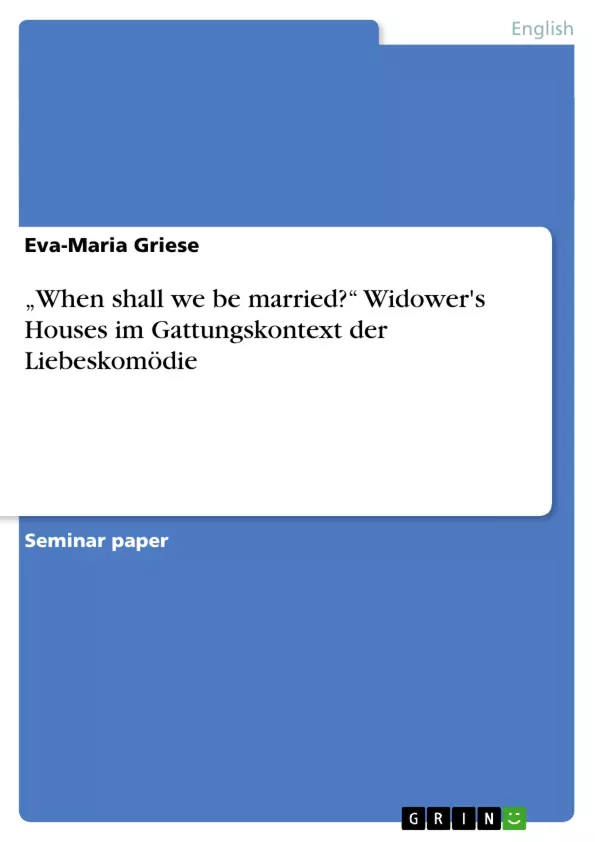Es scheint also, als sei Widower's Houses eine Art realistisches Belehrungsstück, ohne irgendwelche Gattungsmerkmale, oder andere formale Kriterien zu erfüllen.
Diese Sichtweise beschränkt sich allerdings hauptsächlich auf die inhaltliche Ebene des Stücks und lässt Shaws handwerkliche Fähigkeiten als Dramatiker außer Acht. Denn betrachtet man zudem die Entstehungsgeschichte von Widower's Houses, so findet man durchaus Hinweise, die das Stück zum Beispiel durchaus als Liebeskomödie erscheinen lassen, denn ursprünglich war Widower's Houses als solche konzipiert.
Im Folgenden soll nun erarbeitet werden, welche typischen Merkmale die Liebeskomödie ausmachen und ob sich diese Merkmale bei Widower's Houses finden lassen. Genauer betrachtet werden hierzu das Handlungsschema und die Figuren und ihre Konstellation. Anschließend soll beurteilt werden, welcher dramatischen Gattung Widower's Houses zugeordnet werden kann.
Inhaltsverzeichnis
- Widower's Houses - ein sozialistisches Pamphlet?
- Was heißt hier Komödie?
- Widower's Houses eine Liebeskomödie?
- Widower's Houses eine didaktisch-realistische Liebeskomödie
- Primärliteratur
- Sekundärliteratur
Zielsetzung und Themenschwerpunkte
This paper analyzes Bernard Shaw's play "Widower's Houses" within the context of the love comedy genre. It explores the play's potential as a social commentary and its departure from traditional comedic conventions. The analysis considers the historical and artistic context of the play, examining the influence of Shaw's personal and political beliefs, as well as the critical reception of the play.
- The portrayal of social injustices and the critique of capitalism in "Widower's Houses."
- The analysis of the play's comedic elements and its deviation from traditional love comedy tropes.
- The examination of Shaw's unique dramatic style and his use of realism and didacticism.
- The investigation of the interplay between the play's social commentary and its comedic nature.
- The exploration of the play's historical context and its relevance to contemporary society.
Zusammenfassung der Kapitel
- The first chapter delves into the political context of "Widower's Houses," exploring its classification as a socialistic pamphlet and its connection to Shaw's Fabianist ideals. It analyzes the play's initial reception and the dominant interpretations that framed it as a political manifesto.
- The second chapter examines the definition of comedy and, specifically, the love comedy genre. It explores the historical development of comedy and the challenges of defining its universal characteristics. It also delves into the key features of love comedy, including plot structures, character archetypes, and themes.
- The third chapter investigates whether "Widower's Houses" can be classified as a love comedy. It analyzes the play's plot, characters, and thematic elements in relation to the conventions of the genre. The chapter explores the play's departure from typical romantic narratives and its subversion of traditional love comedy tropes.
Schlüsselwörter
The primary keywords and focus topics of this work include: Bernard Shaw, Widower's Houses, love comedy, social commentary, Fabianism, realism, didacticism, political theatre, social injustice, capitalism, plot structure, character archetypes, genre conventions, subversive comedy, historical context.
Frequently Asked Questions
Is Bernard Shaw's "Widower's Houses" just a socialist pamphlet?
While it contains strong socialist critiques and Fabianist ideals, the play also follows specific dramatic structures that align it with the genre of comedy.
Can "Widower's Houses" be classified as a love comedy?
The play was originally conceived as a love comedy. It uses typical elements of the genre, such as a romantic plot and character archetypes, but subverts them to deliver social commentary.
What is the central social critique in the play?
Shaw critiques capitalism and social injustice, specifically focusing on the exploitation of the poor through slum-landlording.
How does Shaw use realism and didacticism?
Shaw uses realistic settings and dialogue to educate his audience (didacticism) about societal issues, moving away from purely escapist entertainment.
What is the significance of the play's title?
The title refers to the biblical concept of "devouring widow's houses," highlighting the predatory nature of the landlord class depicted in the play.
How did the audience initially receive the play?
Initial reactions were mixed, as many viewers were challenged by Shaw's blend of comedic form with harsh political and social truths.
- Citation du texte
- Eva-Maria Griese (Auteur), 2007, „When shall we be married?“ Widower's Houses im Gattungskontext der Liebeskomödie, Munich, GRIN Verlag, https://www.grin.com/document/88611



